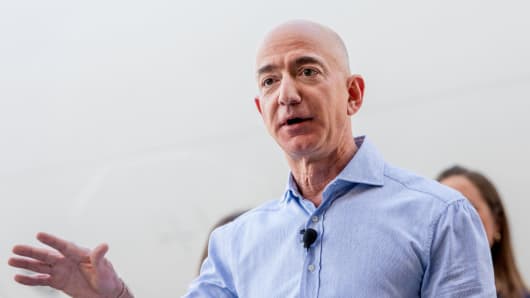 |
|---|
 |
|---|

Leonard Ortiz | Digital First Media | Getty Images
Jeff Bezos, founder and CEO of Amazon, speaks to a group of Amazon employees that are veterans during an Amazon Veterans Day celebration, to honor the Warriors@Amazon, a group of employees who have served in the military and their spouses, in an event outside a hanger at the Long Beach Airport in Long Beach on Monday, November 12, 2018. The event included the unveiling Amazon's 40th airplane named Valor in honor of the group. (Photo by Leonard Ortiz/Digital First Media/Orange County Register via Getty Images)
The health-technology industry is wrapping up a marquee year.
Start-ups in the space got record levels of funding from venture capitalists, and the second half of the year featured some notable acquisitions, including ResMed's $225 million purchase of Propeller Health this month.
Large technology companies such as Apple and Amazon explored opportunities to get their products into the medical sector, and they made some important hires along those lines. In response, traditional health-care companies, including pharmaceutical makers and health plans, forged their own partnerships with tech developers to help them modernize their offerings and improve the consumer experience.
That's all in the rearview mirror now. What's likely to happen in the year ahead?
CNBC asked a dozen experts from across the health-care industry for their predictions. Here are their top picks:
In 2018, the Apple Watch introduced an electrocardiogram to monitor a user's heart rhythm and look for potential irregularities, including a type of arrhythmia known as atrial fibrillation. The company got clearance from regulators for the new ECG feature.
What's next?
These recent additions to the Apple Watch "will start a serious health feature arms race for all the makers of wearables," said David Albert, a cardiologist and the co-founder of AliveCor, a wearables company that specializes in heart health. In other words, companies such as Samsung and Alphabet will likely have to step up with breakthroughs of their own.
And all that might lead to some major innovation in 2019 that would impact millions of people. One might be for a company to figure out a way to track blood pressure, or a proxy for it, without a cuff, suggests Walter De Brouwer, CEO of a health software start-up called Doc.Ai. De Brouwer previously worked on biomedical sensor technology. Many companies have failed to get a product like this to market, but De Brouwer said that "now is the ideal time." A variety of factors will make it possible in 2019, he said, including the increasing openness of regulators to new ideas, coupled with some recent improvements in sensors and algorithm-based technology.
If a company such as Apple does that, he says, they'll come into the following year "owning the new vital signs of the twenty-first century."
WATCH: Why medical bills are so expensive

How American health care got so expensive
Most people don't associate health plans with innovation. But the executives behind a growing crop of "Medicare Advantage" plans are hoping to change that.
As baby boomers age into Medicare, many are opting to receive benefits through private plans approved by the government, known as Medicare Advantage. These plans have been among the fastest to adopt new technologies, in part because of the way they get paid. They typically make money by taking on the risk of caring for a population, and the most successful among them will invest in keeping their members as healthy as possible.
Sachin H. Jain, CEO of Anthem-owned health system CareMore Health, said 2019 will be a big year for partnerships between technology companies and MA plans. For instance, CareMore was among the first plans to start working with Lyft this past year, meaning it agreed to cover Lyft rides for seniors who needed help getting to the doctor's office. Next year, he said, he plans to meet with more technology companies that can keep his population healthier while lowering costs.
"I think tech has gotten more sophisticated with wearables and the proliferation of new devices, as well as the enhanced sophistication of cell phones," he said. "We can do a lot to remotely monitor people now."
The one caveat? Jain said that technologists will need to refine their pitch to help insurers reach the right population. Not everyone will benefit from a wearable that tracks potential heart problems, he said, but some would.
"My biggest concern is how do we make sure we are getting to just the right patients who would benefit the most," he said.
Understanding Amazon's overarching strategy for health care, assuming it has one, is a process that requires putting a lot of puzzle pieces together. In 2018, those closely following Amazon's moves got a few big hints that might indicate a larger and more ambitious plan. To recap, Amazon bought an internet pharmacy called PillPack; it formed an employer health coalition with J.P. Morgan and Berkshire Hathaway, and it offered a big discount on Prime to low-income Medicaid recipients.
What does all this mean?
Well, according to at least one industry expert, it suggests that Amazon will make a very bold play like getting into health insurance in 2019.
"In my opinion, the puzzle is far from complete," said Stephen Buck, co-founder of Courage Health, a health transparency company. "2019 could be the year that Amazon adds a few more big pieces to reveal much larger ambitions in health care by becoming an insurer, pharmacy benefits manager, or both," he said.
Buck said this might be a necessity for Amazon, especially with pharmacy benefits managers — the middlemen that manage prescription drug benefits — integrating with insurers in 2018, such as CVS and Aetna, or Cigna and Express Scripts. That might force Amazon to offer its own integrated system, which it could test with its own employees first before it approached other large employers.
Pharmaceutical companies will be on the hunt for innovators to add to their portfolio, whether it's biotech upstarts, artificial intelligence start-ups or digital health companies, said Daphne Zohar, CEO of a biopharma company called PureTech Health.
Zohar, who teams up with pharma companies through her work at PureTech, said the hot new role in pharma is the chief digital officer. And many of these newly hired execs will work closely in 2019 with technologists and entrepreneurs. Many drugmakers are also looking at innovators to bring in-house through acquisitions so they can fuel "big science areas that they feel they are missing out on," she said, as well as tap into the potential of new technologies that can track how their drugs are faring once they hit the market.
It's also a good time for acquisitions, she said.
"With the recent market correction, we may have reached a sweet spot for M&A activity and this could be the year for multiple big transactions," Zohar said.
Mental health got a lot of attention in 2018, particularly with the high-profile suicides of Kate Spade and Anthony Bourdain. What became clear this year is that a lot of people struggle with mental health challenges, but there aren't ample resources and services to care for them.
Can technology fill the gap?
In 2019, one mental health expert said, there will be new research on how technologies that are widely used by consumers can track conditions such as depression and anxiety. For instance, a Silicon Valley start-up called Mindstrong Health is attempting to use the smartphone keyboard to pinpoint behaviors that might be indicative of depression. For that reason, "the breakout companies will look less like mental health tech, and more like tech that creates efficiencies in the background," said Sarah Seegal, co-founder of Affect Mental Health, an incubator for mental health start-ups.
But Seegal said that 2019 will also raise some important questions related to privacy and consent, especially as consumers start to realize that the technology services they use on a regular basis are collecting knowledge about their health. "If Target knows that you're pregnant, it sure as heck knows if you're bipolar, as patterns of spending money is one of the things used in professional diagnosis."